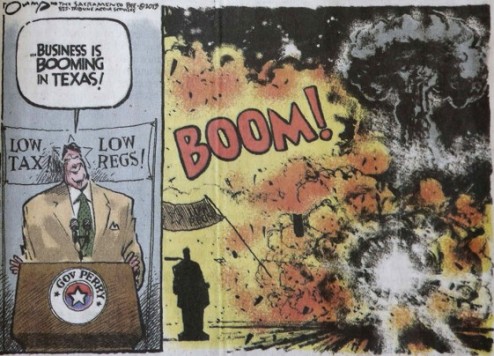Texas Governor Rick “Oops” Perry is upset about the above cartoon by Jack Ohman in the Sacramento, California, Bee newspaper.
An April 17 explosion [at a fertilizer plant] in the town of West, which is outside Waco, left a crater more than 90 feet wide and is estimated to have caused more than $100 million in damage. The blast occurred moments after a fire was reported at the West Fertilizer plant.
Ten of the [14] people killed were first responders who rushed to the nighttime blaze.
In a letter to the Bee’s editor, Perry said it “was with extreme disgust and disappointment I viewed your recent cartoon.”
“While I will always welcome healthy policy debate, I won’t stand for someone mocking the tragic deaths of my fellow Texans and our fellow Americans,” Perry wrote. “Additionally, publishing this on the very day our state and nation paused to honor and mourn those who died only compounds the pain and suffering of the many Texans who lost family and friends in this disaster.”
First of all, Ohman is not mocking anyone’s death. He is making an admittedly uncomfortable point about Gov. Perry’s policy of attracting certain kinds of businesses to Texas through low taxes and weak regulations– and suggesting there can be consequences to such a policy. That policy was on display when Perry tried to convince Illinois companies to relocate to Texas:
Perry, in his media campaign which cost some $80,000, said, “I have a word of advice for employers frustrated by Illinois’ short-sighted approach to business: you need to get out while there’s still time. The escape route leads straight to Texas, where limited government, low taxes and a pro-business environment are creating more jobs than any other state.”
As Thomas O. McGarity, a professor at the University of Texas Law School, wrote at The Christian Science Monitor, here’s what that meant in terms of West Fertilizer Company:
Texas does not have an occupational safety and health program that meets federal requirements. The federal Occupational Safety and Health Administration (OSHA) is therefore responsible for ensuring the safety of potentially dangerous workplaces like the West facility.
OSHA has inspected the West plant exactly once in the company’s 51-year history. That 1985 inspection detected multiple “serious” violations of federal safety requirements for which the company paid a grand total of $30 in fines. OSHA’s 1992 process-safety-management standard for highly hazardous chemicals is supposed to protect against disasters like the West explosion, but it wasn’t in place for that inspection.
Regardless, OSHA lacks the resources to undertake the kind of comprehensive inspection needed to ensure compliance with the process safety standard at small facilities like West Fertilizer Company. OSHA’s tiny staff of around 2,400 inspectors is spread so thin that it would take more than 90 years to conduct even cursory inspections of all eligible workplaces in Texas.
The Environmental Protection Agency (EPA) inspected the facility in 2006 and assessed a fine of $2,300 for failing to update a risk management plan, among other violations involving employee training records and maintenance. The company responded in 2011 with an updated plan stating that the “worst case release scenario” was a release of the contents of a storage tank over a period of 10 minutes; the threat of an explosion was not mentioned. The EPA was apparently satisfied. The EPA lacks the staff to inspect any given facility more than once every decade or so.
The Texas Commission on Environmental Quality has so few inspectors that it can only inspect small plants like the West facility in response to complaints. It inspected the West plant in 2006 in response to a complaint about bad odors, and it was satisfied when the company applied for a new permit. Inspectors weren’t focused on the risk of explosion, though the US Pipeline and Hazardous Materials Safety Administration did fine the company $5,250 that year for improperly planning to transport anhydrous ammonia.
So not only are Texas regulations deliberately kept weak; Republicans in Congress have targeted OSHA for deep budget cuts, which of course will make it even harder for the federal government to fill the gap.
One of the many problems with trying to attract businesses to a state with low taxes, low wages and weak regulations is that another state can always come along and offer lower taxes, lower wages and weaker regulations. This is what’s known as the race to the bottom. Where does it end?
Perry wrote that the Sacramento Bee “owes the community of West, Texas, an immediate apology for your detestable attempt at satire.” I agree that apologies (and more) are appropriate in connection to the tragedy in West. But they don’t need to come from The Bee or its cartoonist.
